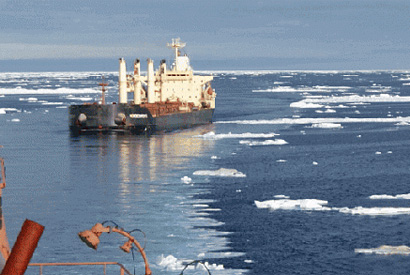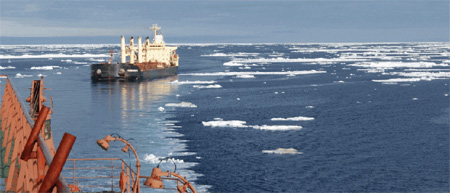Report warns of climate change ‘tipping points’ within our lifetime
UC Berkeley's Tony Barnosky joined climate scientists on Dec. 3 at a press conference at the National Academy of Sciences in Washington, D.C., to summarize a new report focusing on the short-term effects of climate change and the need to monitor them closely.

December 3, 2013
UC Berkeley’s Tony Barnosky joined climate scientists this morning at a press conference at the National Academy of Sciences in Washington, D.C., to summarize a new report issued today focusing on the short-term effects of climate change and the need to monitor them closely.

National Research Council report issued Dec. 3, 2013
“Our report focuses on abrupt change, that is, things that happen within a few years to decades: basically, over short enough time scales that young people living today would see the societal impacts brought on by faster-than-normal planetary changes,” said Barnosky in an email. Barnosky is professor of integrative biology and a member of the Berkeley Initiative in Global Change Biology (BIGCB).
The report, “Abrupt Impacts of Climate Change: Anticipating Surprises,” is available from the National Research Council, part of the National Academies.
Abrupt changes are already apparent, the authors noted: the number of serious wildfires has increased dramatically over the past decade, farmers are noticing hotter average temperatures that affect their crop yields, animals and plants are moving up mountainsides to reach cooler temperatures, and the Artic sea ice is melting back more and more each summer.
“A key charge to the committee was to try to identify the parts of the climate system where we would expect to see tipping points – major changes in ocean currents or atmospheric circulation – but also trying to determine how even gradual climate change might trigger tipping points in systems that are affected by climate change,” he wrote.
Changes in ocean temperatures and acidity, for example, could reach a threshold that would precipitate a crash in coral reef ecosystems, he said. But global change could also lead to economic and social impacts, much of this centered around food and water resources and the likelihood of international conflict to secure them.
The report emphasizes the need to monitor Earth’s ecosystems for early signs of serious change so that we can act to avoid them. For example, scientists don’t fully understand how Antarctica’s glaciers will react to warming temperatures: slow melting might take centuries, yet calving of icebergs could lead to their disappearance much sooner, causing sea level rise beyond the already predicted 3 feet by 2200. Ocean temperatures should be monitored closely near the West Antarctic Ice Sheet, the report urges.
“We hope to limit the number of blindsides,” said report coauthor Richard Alley of Pennsylvania State University during the briefing.
Tipping points
Barnosky was the lead author of a 2012 paper that warned of a global tipping point at which Earth’s systems would irreversibly change as a result of changing climate.
“We probably have been underestimating the potential effects of ongoing climate change in exacerbating the extinction crisis we already find ourselves in, so far due to non-climatic causes like human-caused habitat loss, overexploitation of economically valuable species, and pollution,” he wrote. “Even on its own, the committee found climate change to pose a very real extinction threat. Added to all the other stressors, it really could be the proverbial straw that breaks the camel’s back.”

A ship crossing the Northern Sea Route that is now open because of sea ice disappearance, one of the abrupt consequences of climate change. Photo by Nordic Bulk Carriers.
The good news is that some climate change impacts will stretch out over a century or more, allowing more time to adapt. Most climate models show that big changes in the North Atlantic that would affect ocean currents are unlikely in the short term, while the release of methane from the sea floor is unlikely to happen in huge belches that would alter the climate overnight, according to the report. Yet these are going to happen eventually if greenhouse gases, primarily carbon dioxide, are not reduced. Currently, the world needs to reduce these emissions about 5 percent each year for the next 38 years to limit the average global temperature rise to 2 degrees Celsius (3.6 degrees Fahrenheit).
“Luckily, there is still time to slow climate change if we start dramatic cutbacks to greenhouse gas emissions now,” Barnosky wrote. “That will allow us to avoid the worst-case tipping point scenarios, but that window of opportunity will only be open for another few years, if we continue to change climate at the rate we have been.”
The study was sponsored by the National Oceanic and Atmospheric Administration, National Science Foundation, U.S. intelligence community and the National Academies.
RELATED INFORMATION
- Abrupt Impacts of Climate Change: Anticipating Surprises (NRC report)
- Scientists uncover evidence of impending tipping point for Earth (6/6/12 press release)